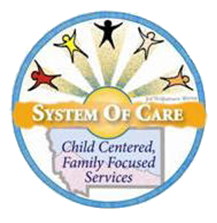Children's System of Care (SOC) Planning Committee
The Children’s SOC Planning Committee was established by statute in 1993 (52-2-301, 52-2-303,52-2-304 MCA) to develop an integrated service system for children under age 18 who are seriously emotionally disturbed (SED), at risk for placement in an out-of-home setting, and needing the assistance of more than one state agency. The statute was updated in 2001 to further describe a children’s System of Care and to define the duties of the planning committee.

The Children’s SOC Planning Committee is made up of approximately 30 members who represent family members of youth, Native Americans, advocacy groups, and mental health providers that serve young people and community members. The Director of Department of Public Health and Human Services (DPHHS) appoints the members.
The Children’s SOC Planning Committee duties include:
- Developing policies aimed at eliminating or reducing barriers to the implementation of a system of care
- Promoting development of a quality array of core services in-state so that SED youth can avoid out-of-state placements
- Encouraging development of the infrastructure of the system of care by encouraging development of local interagency teams
For more information, contact Renae Novak, Children’s Mental Health Services, (406) 444-7064 .
Grant
Vision 21Linking Systems of Care for Children & Youth Demonstration Project (LSOC) |
Public Comment Statement/Privacy Statement:

